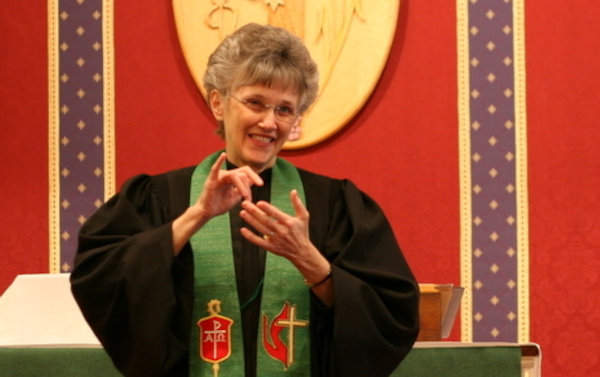Global Methodist Missions Conference of the Deaf makes history with certified lay servant course.
SAM HODGES
United Methodist News Service
This week, Michelle Martin is beginning to realize her dream of becoming a recognized leader in The United Methodist Church.
She’s joined some 20 other Deaf and Hard-of-Hearing people in taking a 10-hour, basic class toward certified lay servant status.
Before, obstacles — such as a lack of interpreters — always emerged.
“This is the first time I was able actually to take a lay servant’s class and start on the path where God wants me to go,” said Martin, of Cypress United Methodist Church in Cypress, Texas.
The course itself is a first. Never before has the denomination offered lay servant instruction tailored to the Deaf.
“This is history-making,” said Philadelphia Area Bishop Peggy Johnson. “Our system is not that friendly for people with language challenges … . This (course) empowers people to be involved in ministry.”
The high-profile class is just part of the Global Methodist Missions Conference of the Deaf, underway through Aug. 4 at a conference center about 40 miles south of Dallas.
Every four years, the conference brings together Deaf people and Deaf ministry specialists from Methodist denominations across the world.
Johnson began the event in 2005, when she was pastor of Christ Church United Methodist Church of the Deaf in Baltimore. She invited to the city colleagues in Deaf ministries, including as lead presenter the Rev. Sang-Suck Nam of the Seoul Church of the Deaf.
“The Koreans had 13 Deaf churches, each with Deaf pastors and sending Deaf missionaries — some to countries where the Christian faith is discouraged and even persecuted,” Johnson said. “It was my hope that starting an international conference would give us a Holy Spirit jolt to be evangelists for Christ’s love among the Deaf around the world and in the U.S.”
The second conference was in South Korea and the third in Kenya.
This fourth gathering, in Texas, has been largely organized by another longtime Deaf ministry leader, the Rev. Tom Hudspeth, executive pastor of Dallas’ Lovers Lane United Methodist Church.
There are Deaf people here from South Korea, Kenya, Ghana and Sri Lanka, as well as from across the United States. For the first time, South America is represented, a group having come from a fast-growing Deaf congregation within Central Methodist Church of Belo Horizonte, Brazil.
Five different forms of sign language are in use, presenting a challenge for organizers, but also an inspiring display of finger fluency.
“When we go into worship and the Holy Spirit joins us, and the interpretation flows from language to language and there’s that sense of community worship, it’s the closest thing I know to what Pentecost must have been like,” said Michelle Menefee, conference interpreter coordinator.
Emphasizing the central role of sign language is the conference’s guiding Bible verse, Isaiah 49:16: “Look, your names are on my hands.”
The conference offers a range of talks and presentations, as well as reports from the different countries on their work in Deaf ministries. It’s a time to network and share resources, and United Methodists are touting one that’s come about since the last conference.
Deaf ministry leaders from the denomination collaborated in the creation of an American Sign Language video glossary, explaining religious terms.
“We talk about that every chance we get,” said Menefee, who coordinated the project and does interpretation for the Deaf at St. Luke’s United Methodist Church in Houston.
This conference is all about extending Deaf ministries, given research showing only about 2 percent of Deaf people attend church. Even in The United Methodist Church, which has a denomination-wide Deaf ministries committee, only a tiny minority of congregations are intentional about welcoming the Deaf to worship and other activities.
Along with Deaf ministry for and with Deaf people, this conference stresses ministry by them.
“Deaf people have been very dependent on hearing people for leadership,” said the Rev. Kirk VanGilder, a Deaf United Methodist elder and associate professor of religion at Gallaudet University, a school for the Deaf in Washington, D.C. “We want to even out the playing field.”
The certified lay ministry is a push toward that end. It’s taught by Carol Stevens, a certified lay minister and Deaf ministries leader in the Peninsula-Delaware Conference.
She noted that the traditional course, even when interpreters are available, offers a “hearing people’s slant.” So she went to work, adapting.
“I took the existing curriculum and threw out a lot of things that weren’t applicable and put in a lot of things that were,” she said. “Discipleship Ministries gave it their approval.”
In leading the class, Stevens uses American Sign Language. Either she speaks simultaneously or an interpreter puts her signed words into spoken English. Other interpreters take the spoken words and put them into other sign languages.
Stevens had to cram Methodist history into an hour, fast-forwarding through the movement’s start by John Wesley to its spread into and across North America, thanks to such leaders as Francis Asbury and Thomas Coke, and to the circuit riders.
“That’s as much preaching as you’re going to get from me,” Stevens told the class at the end of the Aug. 1 history segment.
Most of the rest of the first day was interactive and collaborative, with class members often working in small groups as they explored the nature of ministry and identified important leadership traits.
The group included the Rev. Ronilson Lopes. He can hear, he’s a pastor and he’s already a Deaf ministry leader in the Methodist Church in Brazil. But he had a strong motive for being there with the Deaf people hoping to become certified lay servants in The United Methodist Church.
“I want to take this training back with me,” Lopes said.
Last Updated on December 22, 2022

